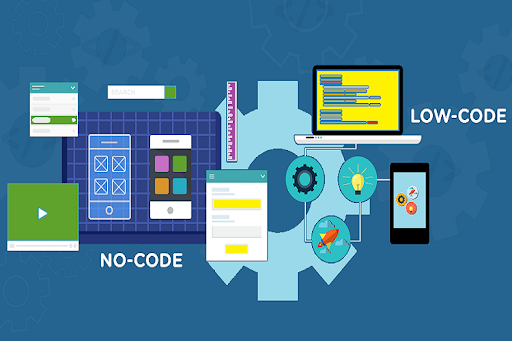In recent years, the demand for faster and more efficient software development has given rise to a new wave of tools: no-code and low-code platforms. These platforms are revolutionizing the way applications are built, enabling users with little to no coding experience to create functional websites, apps, and automation tools. While these platforms have simplified development for non-developers, they also bring new opportunities and challenges for professional developers. Understanding the impact of no-code and low-code solutions is key to staying competitive in the evolving tech landscape.
What Are No-Code and Low-Code Platforms?
No-code platforms allow users to create applications through a visual interface, eliminating the need for writing any code. They are designed for non-technical users like business owners, marketers, and designers who need to build digital products without relying on a developer. Popular no-code tools include platforms like Webflow and Bubble.
Low-code platforms, on the other hand, offer a mix of visual development and coding. They allow developers to build more complex applications with minimal hand-coding while still providing flexibility for customization. Examples of low-code platforms include Mendix and OutSystems.

Why No-Code and Low-Code Platforms Are Gaining Popularity
- Faster Development Time
No-code and low-code platforms significantly reduce the time it takes to develop applications. By using drag-and-drop interfaces and pre-built components, these platforms allow for quicker iteration and deployment. This is particularly beneficial for small businesses and startups that need to launch products rapidly without a large development team. - Cost-Effectiveness
For businesses, hiring developers and maintaining custom code can be expensive. No-code and low-code platforms lower development costs by reducing the need for specialized programming skills. Non-technical team members can build and maintain applications on their own, saving on outsourcing or hiring additional IT staff. - Empowering Non-Technical Users
No-code platforms empower people with no coding background to take control of digital product creation. This democratization of software development allows for greater creativity and faster problem-solving within teams, as anyone can contribute to building solutions without waiting for developers. - Increased Agility
These platforms make it easier to adapt to changes in business needs or market demands. With a no-code or low-code tool, companies can quickly test new ideas, create prototypes, and launch new features without going through lengthy development cycles. The ability to pivot quickly is a major advantage in today’s fast-paced digital world.

What Developers Should Know About No-Code and Low-Code Platforms
Despite the many advantages, no-code and low-code platforms have limitations that developers need to be aware of. While these tools are excellent for rapid prototyping and simple applications, they may lack the flexibility, scalability, and customization that more complex projects require.
- Limited Customization and Scalability
One of the biggest challenges of no-code platforms is their limited customization. Developers working on enterprise-level applications or projects requiring unique features may find the platform’s capabilities too restrictive. Low-code platforms offer more flexibility, but advanced customizations still require a solid understanding of coding languages. - Security Concerns
Security is a critical concern for all applications, and no-code/low-code platforms are no exception. While these platforms provide some security features out of the box, they may not meet the rigorous security standards needed for highly sensitive or complex applications. Developers need to carefully assess whether these platforms provide the necessary security for their projects. - The Need for Traditional Coding Skills Remains
While no-code and low-code platforms are becoming more popular, they won’t replace the need for skilled developers. Large-scale applications, backend development, and systems that require deep integrations still rely on traditional coding methods. Developers who can blend no-code/low-code skills with deep technical expertise will remain highly valuable in the job market. - Opportunities for Collaboration
No-code and low-code platforms create opportunities for collaboration between developers and non-technical teams. Developers can focus on the more complex aspects of a project, while non-technical colleagues handle simpler tasks. This approach allows for more efficient workflows and quicker project completion.

The Role of Developers in a No-Code/Low-Code World
Rather than viewing these platforms as a threat, developers can leverage them to work more efficiently. By offloading simpler tasks to no-code or low-code tools, developers can focus on high-value, complex projects that require their expertise. Additionally, developers who understand these platforms can offer better guidance to businesses on when to use them and how to integrate them into broader development strategies.
Conclusion
The rise of no-code and low-code platforms has undeniably changed the software development landscape. These platforms offer fast, cost-effective solutions for building applications, empowering non-developers and speeding up business processes. However, they are not a complete replacement for traditional coding, and developers still play a crucial role in creating scalable, secure, and complex applications.
At CV Infotech, we understand the importance of both traditional coding skills and the growing trend of no-code and low-code solutions. Our WordPress development training program and other IT courses prepare developers to navigate this evolving environment, combining essential coding knowledge with practical skills in popular platforms. We offer the best training in IT, ensuring that our students stay ahead of industry trends and are ready to tackle any development challenge. Whether you’re just starting or looking to upskill, CV Infotech has the tools and training you need for success in the tech world.
Ready to enhance your development skills? Join CV Infotech Training today and become an expert in modern development practices!

